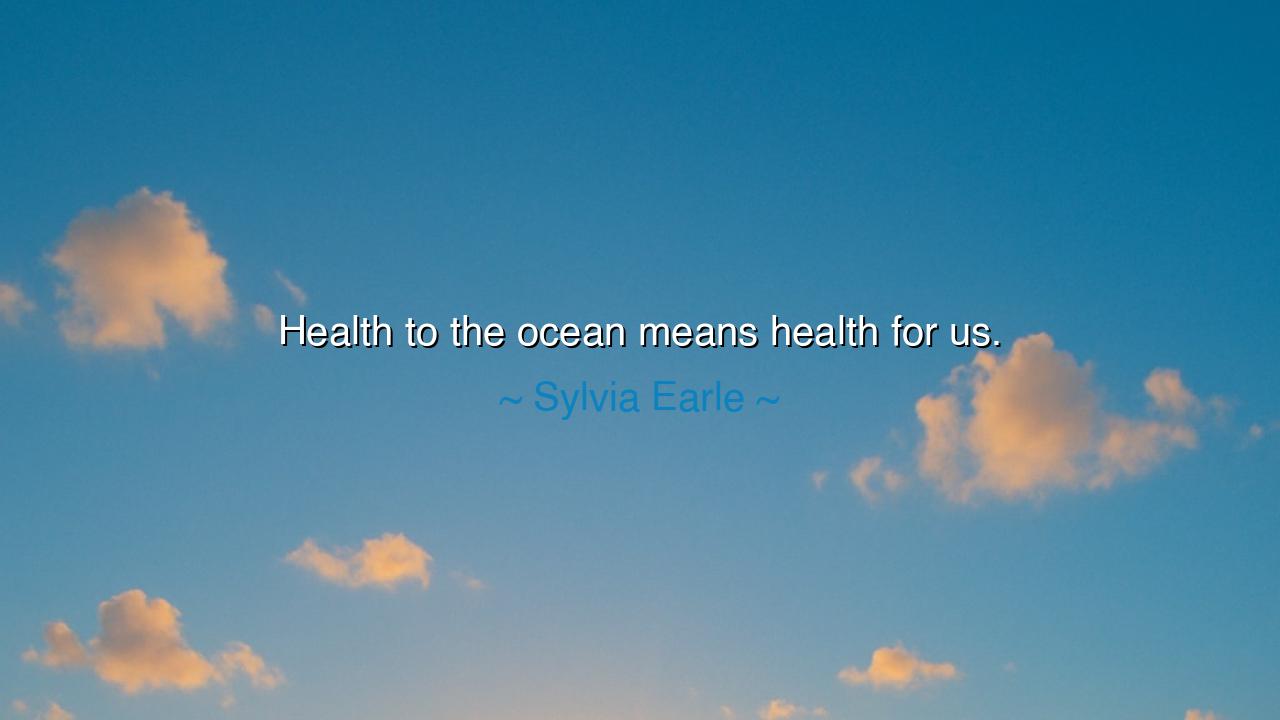
Health to the ocean means health for us.






Hearken, O children of generations yet unborn, and attend to the words of Sylvia Earle, who spoke with reverence for the boundless deep: “Health to the ocean means health for us.” In these words lies a truth as ancient as the first mariners who gazed upon the vast waters: the fate of humanity is intertwined with the fate of the seas, for in the rhythms of the ocean flow the very currents of life that sustain all beings.
Consider first the interconnectedness of life. The ocean is not merely a vast expanse of water, but a living network of creatures, plants, and ecosystems. Its health dictates the air we breathe, the food we consume, and the climate that nurtures the lands. Earle’s words echo the wisdom of ancient civilizations: the Egyptians revered the Nile, the Greeks honored Poseidon, and the Polynesians navigated by the waves—all recognizing that human well-being is inseparable from the vitality of the waters that surround and sustain them.
The phrase “health for us” reminds us that human flourishing is contingent upon balance and stewardship. When oceans are polluted, overfished, or disrupted, the effects ripple outward, touching every shore, every generation. History provides stark lessons: the collapse of fisheries in the Mediterranean during antiquity and the near-destruction of the Aral Sea in modern times illustrate that when water systems falter, so too does human society. The seas are the veins of the planet, and their suffering is our own.
Earle’s reflection also emphasizes the moral duty of guardianship. The ancients believed that humans were stewards of the earth, accountable to the gods and to future generations. To honor the ocean is to honor life itself, to act with foresight and humility. Sylvia Earle’s lifelong devotion to exploration and conservation embodies this principle: she has ventured into the depths, witnessed the fragility of coral reefs, and sounded the alarm on humanity’s impact, urging that protection of the seas is not optional, but essential.
Consider the story of Jacques Cousteau, who illuminated the wonders of the ocean for the world, revealing both its beauty and its vulnerability. His films inspired generations to value the seas, reminding all that knowledge begets responsibility. Earle’s words build upon this legacy, asserting that the preservation of oceans is not merely an ecological concern, but a matter of survival, ethics, and foresight.
From this reflection emerges a timeless lesson: our prosperity, health, and continuity are inseparable from the condition of the oceans. Neglect, exploitation, or indifference to the seas is not distant or abstract; it returns upon us in storms, scarcity, and climate upheaval. To safeguard our future, we must act with vigilance, understanding, and respect for the intricate web of life that sustains us.
Practical action flows naturally from this wisdom. Reduce pollution, advocate for sustainable fishing, support marine protected areas, and educate others about the importance of ocean health. Each choice, however small, contributes to the vitality of the seas, and by extension, to the health of humanity itself. Stewardship is not a passive virtue, but a daily commitment to the continuity of life.
Finally, remember the eternal truth: the ocean is the cradle and mirror of our existence. Sylvia Earle’s words are a clarion call to guardianship: protect the waters, honor their rhythms, and understand that the fate of humanity is inseparable from the fate of the ocean. In caring for the seas, we care for ourselves, our children, and all generations yet to come.
If you wish, I can also craft a narration-ready version of this reflection, with natural rises and falls to capture the grandeur, urgency, and reverence of Earle’s insight.






AAdministratorAdministrator
Welcome, honored guests. Please leave a comment, we will respond soon